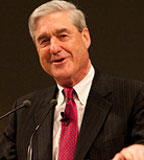Award winners Mueller '66 and Jackson *86 highlight Alumni Day
Each of Alumni Day’s top honorees dreamed of becoming doctors, they said in campus addresses Feb. 25, but FBI director Robert Mueller III ’66 and Environmental Protection Agency administrator Lisa P. Jackson *86 ended up on very different paths. Each talked about how formative experiences at Princeton and elsewhere reshaped their career paths and led to their leadership of government agencies.

For Mueller, the Woodrow Wilson Award winner, a difficult Princeton class on organic chemistry derailed his plans for a medical career, he said in remarks in Richardson Auditorium. He earned his bachelor’s degree in politics instead. But it was the death of David Hackett ’65 on a Vietnam battlefield that helped set Mueller on the path to public service, he explained. Hackett and Mueller played together on Princeton’s lacrosse team.
“One would have thought that the life of a Marine, and David’s death in Vietnam, would argue strongly against following in his footsteps. But many of us saw in him the person we wanted to be,” Mueller said. “And a number of his friends, teammates, and associates joined the Marine Corps because of him, as did I. … He taught us the true meaning of leadership. One teammate can change your life. And David Hackett changed mine.”
Jackson, who won the James Madison Medal, spoke about being one of the few women in Princeton’s chemical engineering graduate program, from which she earned a master’s degree in 1986. Her interest in science and math, she said, began with a calculator that she received at an engineering summer camp, and was fueled by attending an all-girls’ high school. “The qualities that have traditionally discouraged young women from pursuing science — that we are not interested in a cold and hard and disconnected discipline — are a misrepresentation of both women and science,” she said.
She initially wanted to be a doctor “because I wanted to help people by treating them when they got sick. I came to realize that if I studied chemical engineering, and started working to protect our environment, I could help people by making sure they didn’t get sick in the first place.” Studying at Princeton “set the trajectory for my entire life. This university is where I had the opportunity to fully immerse myself in what became one of the greatest passions of my life — the exploration of science.”
Read more about Alumni Day 2012 in the March 21 issue of PAW
Alumni Day also included a full slate of lectures by Princeton faculty members, an alumni luncheon at Jadwin Gymnasium, the annual Service of Remembrance, and the presentation of prizes for graduate students and undergraduates. Graduate students Richard Baliban (chemical and biological engineering), William Cavendish (mathematics), William Deringer (history of science), and Andrew Huddleston (philosophy) were honored as winners of the Porter Ogden Jacobus Fellowship. Ann-Marie Elvin ’12 and James Valcourt ’12 shared the Moses Taylor Pyne Honor Prize.
In accepting the Pyne Prize, Elvin, a sociology major and women’s ice hockey player, said that the recognition was “in equal parts unexpected, overwhelming, and deeply, deeply humbling.” Valcourt, a molecular biology major and chairman of The Princeton Tiger, also expressed his thanks. Dressed in a bright orange Princeton tie, he quipped, “It’s rare that I get to wear such a hideous tie and fit right in.”
Other awards presented on Alumni Day:
The Princeton Schools Committee S. Barksdale Penick, Jr. ’25 Award
Princeton Club of Africa, Egypt Region, Princeton Club of Orange County, and Princeton Club of Northwestern New Jersey, Union County Region.
The Class of 1926 Trophy (Annual Giving, largest amount raised)
The Class of 1986, $9,001,986
The Jerry Horton Award (Annual Giving, expanding giving and participation)
Annual Giving Section of the South
The Harold H. Helm Award (Annual Giving, exemplary and sustained service)
Frederick G. Strobel ’74












No responses yet